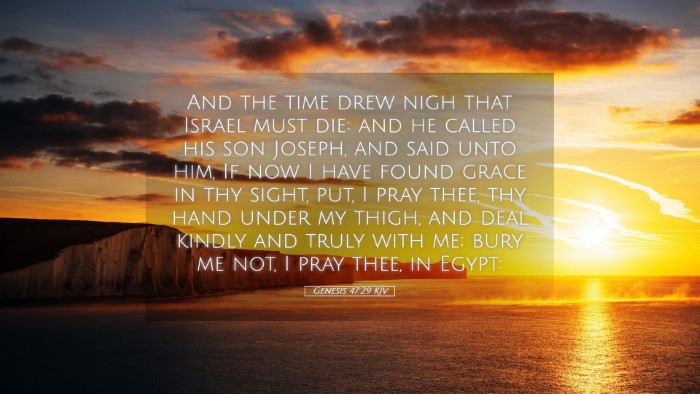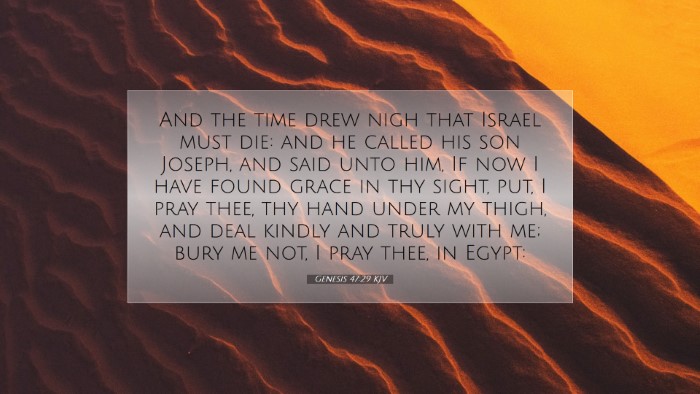Commentary on Genesis 47:29
Verse Context: Genesis 47:29 states, "And when the time drew near that Israel must die, he called his son Joseph, and said unto him, If now I have found grace in thy sight, put, I pray thee, thy hand under my thigh, and deal kindly and truly with me; bury me not, I pray thee, in Egypt."
This verse captures a significant moment in the life of Jacob (Israel) as he approaches the end of his earthly life. It highlights themes of faith, family, and the covenant promises of God. The act of calling Joseph conveys the closeness of their relationship and the trust Jacob places in him.
Insights from Commentators
Matthew Henry's Commentary
Matthew Henry notes that the context of this request reflects Jacob's understanding of the covenant promise made by God to his forefathers. He emphasizes that Jacob, though in Egypt, did not want to be buried there, as it represented a foreign land to the promises of God regarding the land of Canaan. Henry remarks:
- The Act of Oath: Henry highlights the significance of Jacob placing his hand under Joseph's thigh as a symbol of a solemn oath, indicating the seriousness of Jacob’s request.
- Faith in God's Promises: He points out that Jacob’s insistence on being buried in Canaan demonstrates a steadfast faith in God's promise to give the land to his descendants.
- Family Duties: Henry interprets this moment as not only a personal request but also an obligation for Joseph and the sons of Jacob to remain committed to their heritage.
Albert Barnes' Notes on the Bible
Albert Barnes elaborates on the emotional gravity of Jacob's plea. He observes the following:
- Symbolism of the Thigh: Barnes explains that the thigh was considered a source of strength and thus signifies an engagement to uphold the integrity of the family’s legacy.
- Jacob’s Recognition of Mortality: He points out Jacob's awareness of his impending death and how this reality shapes his wishes for posthumous arrangements.
- Kinsman’s Responsibility: Barnes underscores the role of family in honoring the last requests of a patriarch, thus linking it to larger themes of familial fidelity.
Adam Clarke’s Commentary
Adam Clarke provides insight into the cultural practices surrounding burial and the significance of Jacob's request. His perspectives include:
- Burial Customs: Clarke explains that the Hebrews had specific burial customs and locations, which were essential in maintaining their cultural and religious identity.
- Legacy and Memory: He suggests that Jacob’s request reflects a deep desire for his descendants to remember their heritage, reinforcing the importance of identity in the face of adversity.
- Prophetic Insights: Clarke notes that Jacob’s request is prophetic in nature, as it foreshadows the eventual exodus of the Israelites from Egypt to their promised land.
Theological Implications
The implications of Jacob's request in Genesis 47:29 are profound within the theological landscape:
- Covenant Theology: This passage reinforces God's faithfulness to His covenant relationships. Jacob’s insistence on being buried in Canaan reflects a profound trust in the covenant promises of God.
- Identity and Place: The location of burial is intertwined with identity; thus, Jacob's desire to return to Canaan speaks to the theological assertion that where one is buried speaks volumes about one’s belief in divine promises.
- Hope in the Afterlife: This passage foreshadows beliefs in life beyond death and the continuation of God's promises even after one's earthly life ends, resonating with New Testament themes of resurrection and eternal life.
Reflections for Today’s Reader
As pastors, students, and theologians engage with Genesis 47:29, several reflections emerge:
- Honoring Family Traditions: How can today’s readers honor their familial and spiritual legacies in meaningful and contemporary ways?
- Trusting in God’s Promises: In what ways do we learn to navigate foreign lands (literal and metaphorical) while maintaining faith in God’s promises for us and our descendants?
- End-of-Life Considerations: How do we approach discussions around end-of-life requests with dignity and the recognition of our spiritual heritage?
In conclusion, Genesis 47:29 serves as a rich text for understanding family responsibilities, divine promises, and the cultural significance of burial practices. The combined insights from Matthew Henry, Albert Barnes, and Adam Clarke present a comprehensive view that enriches our understanding of this pivotal moment in Jacob’s life.


